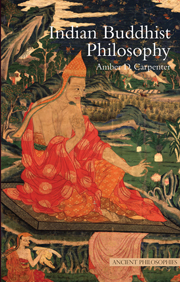Book contents
- Frontmatter
- Contents
- Preface
- Acknowledgements
- Abbreviations
- Chronology
- Development of Buddhist thought in India
- 1 The Buddha's suffering
- 2 Practice and theory of no-self
- 3 Kleśas and compassion
- 4 The second Buddha's greater vehicle
- 5 Karmic questions
- 6 Irresponsible selves, responsible non-selves
- 7 The third turning: Yogācāra
- 8 The long sixth to seventh century: epistemology as ethics
- Epilogue
- Background information
- Notes
- Bibliography
- Index
3 - Kleśas and compassion
- Frontmatter
- Contents
- Preface
- Acknowledgements
- Abbreviations
- Chronology
- Development of Buddhist thought in India
- 1 The Buddha's suffering
- 2 Practice and theory of no-self
- 3 Kleśas and compassion
- 4 The second Buddha's greater vehicle
- 5 Karmic questions
- 6 Irresponsible selves, responsible non-selves
- 7 The third turning: Yogācāra
- 8 The long sixth to seventh century: epistemology as ethics
- Epilogue
- Background information
- Notes
- Bibliography
- Index
Summary
About liberation (the idea), that it is indeed gruesome, consisting of a cessation of all activity. With such a liberation which divorces us from everything, so many good things of life would be finished. How, therefore, can any intelligent person find that sort of liberation characterized by absence of all the pleasures and even of consciousness at all palatable?
The extirpation of desires is not an immediately and universally attractive state to strive for. Even if there are ultimately no selves, even if all suffers, withdrawal of care may seem an uninspiring ideal to adopt in the light of that – and what else could ‘detachment’ be than this? What else does the Buddha mean, when he exhorts us to give up all forms of clinging? If suffering is rooted in desire, attachment and aversion, so that we must ‘cut off’ these roots if we are to end suffering, then it may seem that the game isn't worth the candle – or that the life one is left with (dispassionate, detached, desireless) is just the best of a bad job.
Nor, even if recognizing non-self goes together with the diminution of desires, is it particularly plausible psychologically that we could simply review a reductive mereological argument and thereby leave off desiring, even if we believe the argument sound, and review it clear-headedly many times, so that we are utterly convinced of it.
- Type
- Chapter
- Information
- Indian Buddhist Philosophy , pp. 48 - 71Publisher: Acumen PublishingPrint publication year: 2013



